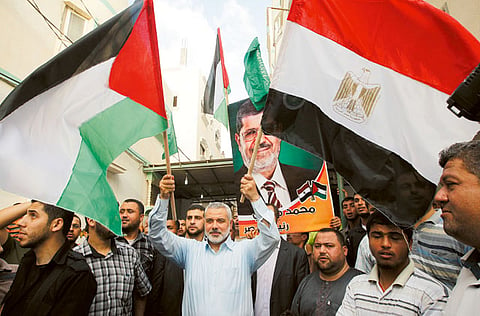Conflict with Egypt military to remain, say experts
Mohammad Mursi pledges to build civil and democratic state for all Egyptians

Cairo: The Muslim Brotherhood’s Mohammad Mursi has been elected Egypt’s first president since Hosni Mubarak’s toppling, an election commission announced on Sunday.
Mursi, a US-educated engineering professor, collected 13.230 million or 51.73 per cent of the valid votes cast in the June 16-17 presidential run-off, said Farouk Sultan, the head of the commission.
His opponent, Ahmad Shafiq, Mubarak’s last prime minister, gained 12.347 million or 48.27 per cent, Sultan told a press conference held amid tight security in Cairo.
“Mursi’s election means calm on the streets,” Amr Hashem, an expert at the state-run Al Ahram Centre for Strategic Studies in Egypt, said on Sunday. “But conflict will remain between the Brotherhood and the military over the presidential powers perceived to have been seized by the generals,” he added.
Mursi has said that he will insist on getting full authority as a president. He also promised to form a broad-based coalition government with the prime minister to be picked from outside the Brotherhood’s Freedom and Justice Party. He, moreover, pledged to build a civil and democratic state for all Egyptians.
The UAE Foreign Ministry yesterday welcomed the results of Egyptian elections and announced that it respects the choice of the Egyptian people.
“The UAE is following with interest the developments sisterly Egypt is witnessing. The UAE, while it welcomes the result of the presidential run-off vote and respects the choice of the brotherly Egyptian people in the context of its democratic transition, hopes that all efforts are concerted now towards maintaining stability, harmony and cooperation among all within the joint national action framework so as to serve higher interests in realisation of aspirations of the Egyptian people for security, stability, decent life and growth,” the ministry said in a statement.
Senior leaders of the Brotherhood have recently warned of a “confrontation between the army and the people” if Mursi was not named the winner.
“Mursi will likely face resistance from state institutions mainly inside the army and the police,” said Sobhi Assila, a political analyst. “However, Mursi has a full team inside the Brotherhood who will assist him in running the country’s affairs to overcome this expected resistance. This may turn Egypt into another Gaza,” he said, referring to the Israeli-besieged Palestinian enclave ruled by Hamas.
State television said that Field Marshal Hussain Tantawi, the head of the ruling military council, congratulated the president-elect on his win. Tensions have mounted in the past few days between the Muslim Brotherhood and the military after a court dissolved the parliament, where the powerful group controlled almost half of the seats. The military further incensed Islamists and liberals by granting itself more powers at the expense of the new president’s.
Hardly had Sultan announced Mursi’s win when thousands of the Brotherhood supporters, campaigning in Cairo’s Tahrir Square in an anti-military protest, celebrated with fireworks and chanted fervently for him.
The protesters, however, said they would not leave before the military reinstated the parliament and revoked an interim constitution perceived as curtailing presidential powers.
Sign up for the Daily Briefing
Get the latest news and updates straight to your inbox



